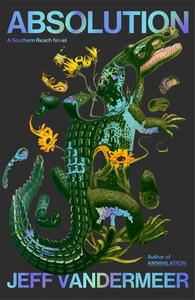
|
|
| Jeff VanderMeer (photo: Ditte Valente) |
|
Jeff VanderMeer is the award-winning author of multiple series--including the Ambergris Trilogy, the Borne novels, and the Southern Reach trilogy--as well as standalones such as Hummingbird Salamander. Absolution (MCD, $30) is the surprise fourth novel in the Southern Reach world.
What brought you back to the Southern Reach Trilogy now?
The fact that it's the 10th anniversary of the original book is coincidental. I had the idea way back in 2017. There was all this stuff about the Séance and Science Brigade that was unable to be unentangled in the first three books. It left a question in my mind, and I always found it fascinating. The idea for the S&SB actually originated when I was in this place called the Coral Castle that was built by this eccentric Latvian who tried to make some of the formations in this Coral Castle attune to things like the equinox and lunar viewings. When I visited it, there was a team of psychics and a team of scientists checking out the place. That always stuck with me.
Then, last year everything clicked around the end of June/July. From August 1 until September 31, all I did was write a lot of it so spontaneously I don't even remember writing things. By the end of December, I had a 150,000-word novel, which has never happened. The gestation period was so long I guess that allowed it to happen. But it was an intense experience of having all these ecstatic visions and literally writing nonstop every day. It was exhausting but exhilarating.
 Why did the writing's nesting-doll, triptych structure feel right for this book?
Why did the writing's nesting-doll, triptych structure feel right for this book?
I've always been a big fan of narratives where there's an accumulation of different stories that interweave, and you get this lovely frisson of discovery from the way they're interacting. As someone who writes a lot of surreal stuff and will often wake up from a dream that inspires a novel, I like to have a really structured scaffolding for the book, so it doesn't just drift off into space. When I realized it's in three parts written completely differently that all interlock, that's what allowed me to write the novel. After I looked at what I'd done, I thought it was a little like reading the original trilogy but in one book, although I hadn't intended that.
Like your recent novel Hummingbird Salamander, this book has some noir/detective elements. What appeals to you about that genre?
The risk when you repurpose a trope or a genre is that you hope you give the reader something new that they like to compensate for the fact that you're defamiliarizing things. In this case, it's a noir cosmic mystery. But what I love about the noir-detective genre is that it's meshed with espionage fiction. The darkest of John le Carré's novels mesh what I would call some sensibility of noir with espionage fiction. I'm a huge fan also of the interiority of le Carré's characters, which I don't know if he gets enough credit for. I love the idea of being all in, beside Old Jim, trying to solve this mystery and trying to untangle the S&SB, knowing that the border is going to come down soon.
Also, noir is known for being dark but not grim, you know? There's the reflection of the neon lights on the streets at night and there's a kind of dark beauty to that. Readers of that genre don't see it as just pessimistic. That's just part of the weird dark glamour of the thing.
In that vein, this novel has a perhaps surprising amount of humor in it. What do you think the role of humor is in a book like this?
I do think the sense of humor I bring to things is something not noticed as much, maybe because of the surrealness of the context. Authority, for example, is meant to be a really humorous book, in a dark way, about bureaucracy. Here and in other books like Borne, it's a really necessary component to avoid monotone and to avoid what I would call an unrealistic view of how even dire events go down. Even nurses in the ER are going to make very dark jokes to center themselves. It's not like they're going to always be serious. There's always a counterpoint.
And that allows me to do something I've never been able to do before, which is use humor to have extremely transgressive themes that, if they were played without humor, wouldn't be as effective and would just be kind of a slog. I got somewhere different with the weird-fiction aspect by using humor. So, it's always very important to me. I try to make it as much of a component of my fiction as possible because it's also part of who I am.
What's with the plethora of journals and the focus on the archival hunt for answers in this book, in particular, but also in Southern Reach as a whole?
For the Ambergris series, I studied tons of history and historical theory, Byzantine history from different points of views. What I eventually came to is that there's an interesting tension for fiction in competing versions of the same event because even the most objective historian is still bringing a point of view. That was really exciting to me.
In this book, we get slightly different versions in the three parts. You get this story that you think you're being just told. Then, you realize Old Jim is constructing it by going through the archives about this 20-year-old expedition and bringing in references to characters who will be more pivotal in Part Two. The layering of that can be very powerful. By the time you get to Part Three, the presence of that, the power of that, is still there. It's still influencing events. That's the way things work in the real world, too. I do think there's something powerful about seeing the detritus of the expedition in Absolution condensed down to dead animals in a stone shed. I think those things become powerful symbols for both a striving that's honorable but also the failures of our ability to understand things.
In your book's acknowledgments, you mention Andy Marlowe, your research assistant and the incredible artist behind the divider images. Can you tell us a bit about that partnership?
First, regarding writing Cass and Jim, sometimes the first reader is really invaluable. In this case, without a close friend to bounce the dialogue off of, that relationship would have been not as good. For some reason, I was having a hard time seeing it. My friend was able to inhabit some scenes even as I wrote them, which changed my creative process in a good way.
As for Andy Marlowe, I asked a professor at FSU if they'd recommend someone as an intern because this was the first novel where morning, noon, and night I was writing. If I stopped for a second, I was going to lose the dream, so to speak. It started out as just a regular research thing. I need this, I need that. One of the things I needed was for someone to map the environmental sites that were real-world influences on the novel to cultural and social sites like African American graveyards, Spanish Conquest sites, things like that, because a lot of information is not layered in official records. It's suppressed or just not known. When I asked them to research the CIA's weird experiments in the '70s, I got back a file that included the CIA's research into the fact that some of their psychics were having dreams of alligators in the future, telling them what the future was going to be. Then, I was like, "Could you translate Schubert's Winter Journey lyrics into English for me?" And they were like, "Sure, I know German!" And then later on, more absurdly, I was like, "Andy, can you do alligator versions of the Schubert lyrics?" And Andy was like, "Sure I can do that!" Because Andy is steeped in North Florida. Suddenly, I was like, "Andy, can you take photos of dead things and jars of the strange aquarium?" "Sure." And that was the other thing that I loved and why we'll probably collaborate in the future: every weird thing I asked for, they were like, "Sure, I can do that." It was just such a wonderful thing that happened as a result of doing the novel. --Alice Martin, freelance writer and editor

